

Emerging global networks for free access to law: WorldLII’s strategies. Graham Greenleaf, Philip Chung and Andrew Mowbray Co-Directors, AustLII & WorldLII* 1.

The emerging ‘free access to law’ network 1.1. The challenges of global legal research. News and Events Year by Year: 1900-2013. Affordable Legal Services, Free Legal Documents, Advice & Ask a Lawyer. U.S. Legal Forms - 36,000 Legal Documents, Forms, Real Estate, Landlord Tenant, Name Change and more. School of Law Legal Research and Writing Guide - Parentheticals are essentially “mini-rule proofs,” where you provide important information about a case in parentheses after you cite to the case.
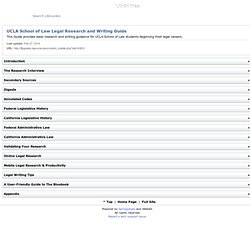
Parentheticals must at minimum provide the facts and holding of a case. Depending on the nature of your written analysis and the precedent case, your parenthetical may also need to briefly address the court’s reasoning. Your parentheticals should contain this information so your reader can understand why the case is relevant to the issue you are addressing. Parentheticals are useful in at least the following four situations. You can use a parenthetical to establish additional authority for a point you have already illustrated with a complete rule proof. In your first year, as well as in the bulk of your practice, you should primarily rely on parentheticals for the first two situations addressed above. Law Student Guide to Free Legal Research. Wex - LII - Dictionary & Legal Encyclopedia. Wisconsin - Electronic Resources. Bankruptcy / Debtor-Creditor Proceedings Coverage to present Guide to resources at the University of Wisconsin Law Library and online.
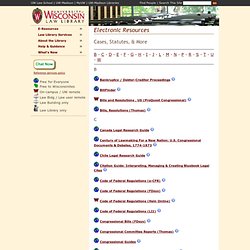
BillFinder Coverage Current calendar year to present (updated daily) Index of state bills for the current calendar year. Basics of Legal Research - Cornell Law. A basic understanding of the United States legal system is essential to knowing what to look for and where to find it.
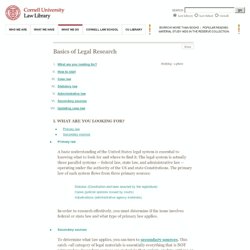
The legal system is actually three parallel systems -- federal law, state law, and administrative law -- operating under the authority of the US and state Constitutions. The primary law of each system flows from three primary sources: Statutes (Constitution and laws enacted by the legislature) Cases (judicial opinions issued by courts) Adjudications (administrative agency materials)
Law Library Justice Foundation: About Us. Emory Law: Electronic Resources. The following is a list of subscription-based law related electronic resources and databases with a brief description of each.
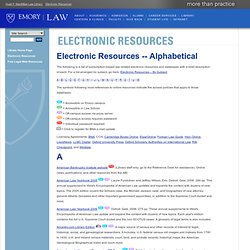
For a list arranged by subject, go here: Electronic Resources -- By Subject The symbols following most references to online resources indicate the access policies that apply to those databases: = Accessible on Emory campus. Law/legal. How To Do Legal Research. Sometimes you need to look up a law to get an answer to your legal question.
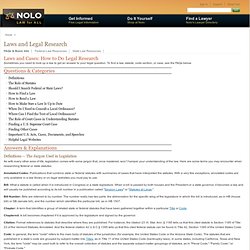
To find a law, statute, code section, or case, see the FAQs below. Definitions -- The Jargon Used in Legislation As with every other area of life, legislation comes with some jargon that, once mastered, won’t hamper your understanding of the law. Legal Definitions. Nolo.com. Locating the Law, 5th edition, revised (2011) The Law Engine! Guide to Law Online. The Guide to Law Online, prepared by the Law Library of Congress Public Services Division, is an annotated guide to sources of information on government and law available online.

It includes selected links to useful and reliable sites for legal information. The Guide to Law Online is an annotated compendium of Internet links; a portal of Internet sources of interest to legal researchers. Although the Guide is selective, inclusion of a site by no means constitutes endorsement by the Law Library of Congress. In compiling this list, emphasis wherever possible has been on sites offering the full texts of laws, regulations, and court decisions, along with commentary from lawyers writing primarily for other lawyers. Materials related to law and government that were written by or for lay persons also have been included, as have government sites that provide even quite general information about themselves or their agencies.
FindLaw. Unpublished Opinions in Federal Courts: An Interview with David Cleveland. « Cornell Law Library's InSITE Website Reviews | Main | Google Reaches Tentative Settlement of Book Search Copyright Class Action » October 29, 2008.
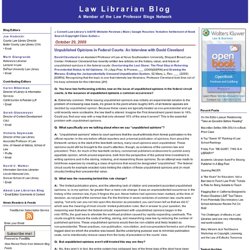
Bulk.resource.org. LII. National Consumer Law Center Online Store. Cultivating lawmaker friendships can lead to more compromise across the aisle. Former California Assemblyman Bill Bagley (R-AD07 Marin/Sonoma, 1960-1974) - known as a moderate - has watched with the rest of Californians as interactions between state lawmakers have become more hyper-partisan and gridlocked.
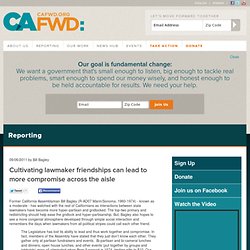
The top-two primary and redistricting should help ease the gridlock and hyper-partisanship. But, Bagley also hopes to see a more congenial atmosphere developed through simple social interaction and remembers the days when lawmakers from all political stripes could call each other friend. The Legislature has lost its ability to lead and thus work together and compromise. In fact, members of the Assembly have stated that they just don’t know each other. They gather only at partisan fundraisers and events. USD - California Guides. Free legal assistance to low-income workers throughout California. Apology of Socrates. A. These notes summarize the interpretation of parts of the Apology that I worked through with you in class. You should know that this interpretation is controversial. Many readers of the Apology would agree with it in whole or part.
But many others would disagree. 1. Law Librarian Blogs - Justia Blawg Search - Law Blogs, Legal Blogs Directory & Search Engine. Legal Document Assistants. Dear Members: On Wednesday, March 6, I attended the regular meeting of the State Bar Board of Trustees along with Carol Ludlow and Terri O’Connor from CALDA, and Kerry Spence from CELA (Cost Effective Legal Access). CAPA (California Alliance of Paralegal Associations) was also represented at the meeting. Supreme Court of the United States. 3 Geeks and a Law Blog. Judge on privacy: Computer code trumps the law.
Australian High Court Judge Justice Kirby says computer code is more potent than the law--and that legislators are powerless to do anything about it.
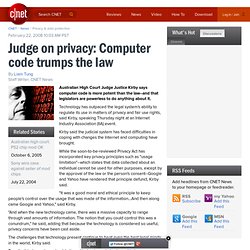
Technology has outpaced the legal system's ability to regulate its use in matters of privacy and fair use rights, said Kirby, speaking Thursday night at an Internet Industry Association (IIA) event. Kirby said the judicial system has faced difficulties in coping with changes the Internet and computing have brought. While the soon-to-be-reviewed Privacy Act has incorporated key privacy principles such as "usage limitation"--which states that data collected about an individual cannot be used for other purposes, except by the approval of the law or the person's consent--Google and Yahoo have rendered that principle defunct, Kirby said. "It was a good moral and ethical principle to keep people's control over the usage that was made of the information...And then along came Google and Yahoo," said Kirby.
Sac Law Library. 2011 – The year that law firm websites become “publishing platforms” In my last post, I predicted that we’re heading towards a major shift in the way that law firms think about their websites. Here’s what it boils down to: Old thinking: Law firm websites = online brochureNew thinking: Law firm websites = publishing platform for attorney-generated content Why a publishing platform? E-mail. Managing Your Small Business’s Online Reputation. Internet Archive: Legislative Assembly of Ontario Collection.
The Revised ICC Arbitration Rules. Free Online Legal Research. International Comparative Legal Guides (ICLG) - practical insights into cross-border law. Social media policies - Google Fusion Tables. Law.Gov: America's Operating System, Open Source. Famous Trials - UMKC School of Law - Prof. Douglas Linder. National Venture Capital Association. Online Public Access. Welcome to HeinOnline. Federal Energy Management Program: Sample Documents for Power Purchase Agreements. Things People Said: Courtroom Quotations. The following quotations are taken from official court records across the nation, showing how funny and embarrassing it is that recorders operate at all times in courts of law, so that even the slightest inadvertence is preserved for posterity.
Lawyer: "Was that the same nose you broke as a child? "Witness: "I only have one, you know. " Lawyer: "Now, Mrs. Johnson, how was your first marriage terminated? "Witness: "By death. " Accused, Defending His Own Case: "Did you get a good look at my face when I took your purse? " The defendant was found guilty and sentenced to ten years in jail. LAW BLOGS. Fitzroy Legal Service - home. THOMAS (Library of Congress) Manipulation.
United States Code: Title 10,899. Art. 99. Misbehavior before the enemy. Regulations.gov. Grayson law librarian's work published. The Bluebook. RPTE eReport. People of Resource – Pocket NDA. FARSite ZoomSearch. You be the Judge - A guide to sentencing. American Bar Association. BOOKS TO PREPARE FOR LAW SCHOOL. Students often ask me what books would be helpful to read in order too prepare for law school.
This is difficult because law school involves complex issues that have not been systematically or well addressed by evangelical scholars and works specifically on human law. As a result, I cannot recommend a single book that will give you a complete perspective on the law. Instead, it is necessary to read a whole variety of books and synthesize the materials in order to come to a proper understanding of human law from a biblical perspective. So for that synthesis, and to prepare yourself for studying human law and understanding legal systems, I would recommend the following: 1. 2. 3. 4. 5. 6. 7. 8. 9. 10. 11. Law Books & Periodicals - James Publishing. Lawschoolhelp.com. How to Flex Your Rights During Police Encounters. See Something? Cite Something. WHAM. That’s gotta be the biggest damn comic-chart there ever was, right?
Scholar Library Links. Get the most out of Google Scholar with some helpful tips on searches, email alerts, citation export, and more. Finding recent papers Your search results are normally sorted by relevance, not by date. To find newer articles, try the following options in the left sidebar: Zimmerman's Research Guide - American Law Reports (ALR) Summary judgment in a “Solicitors from Hell” case. This post originally appeared on Media Lawyer, the indispensable subscription service from the Press Association covering all aspects of media law. It is reproduced with permission and thanks. A solicitor who was defamed by an anonymous posting on the Solicitors from Hell website won summary judgment and libel damages of £17,500 from Rick Kordowski, the man who set up and runs the site. Courts rarely grant summary judgment in defamation cases, doing so only when a defendant has no defence to the action.
Law - Cover Letters. Contents A. Purpose. Legal Research, Forms and other Legal Information- Loislaw. Model Legal Documents. What Are The NVCA Model Venture Capital Financing Documents? FAR Matrix. Docracy - Free Legal Documents. Private Placement - Private+Placement, Private Placement Memorandum (PPM) Services, Find 100's of Business Template documents for sale and download. Templates and Sample Docs used for raising growth capital from Investors.
Welcome to standardforms.org - legal wiki. All FAR. Www.iccwbo.org/uploadedFiles/Court/Arbitration/other/2012_Arbitration and ADR Rules ENGLISH.pdf. Regulations.